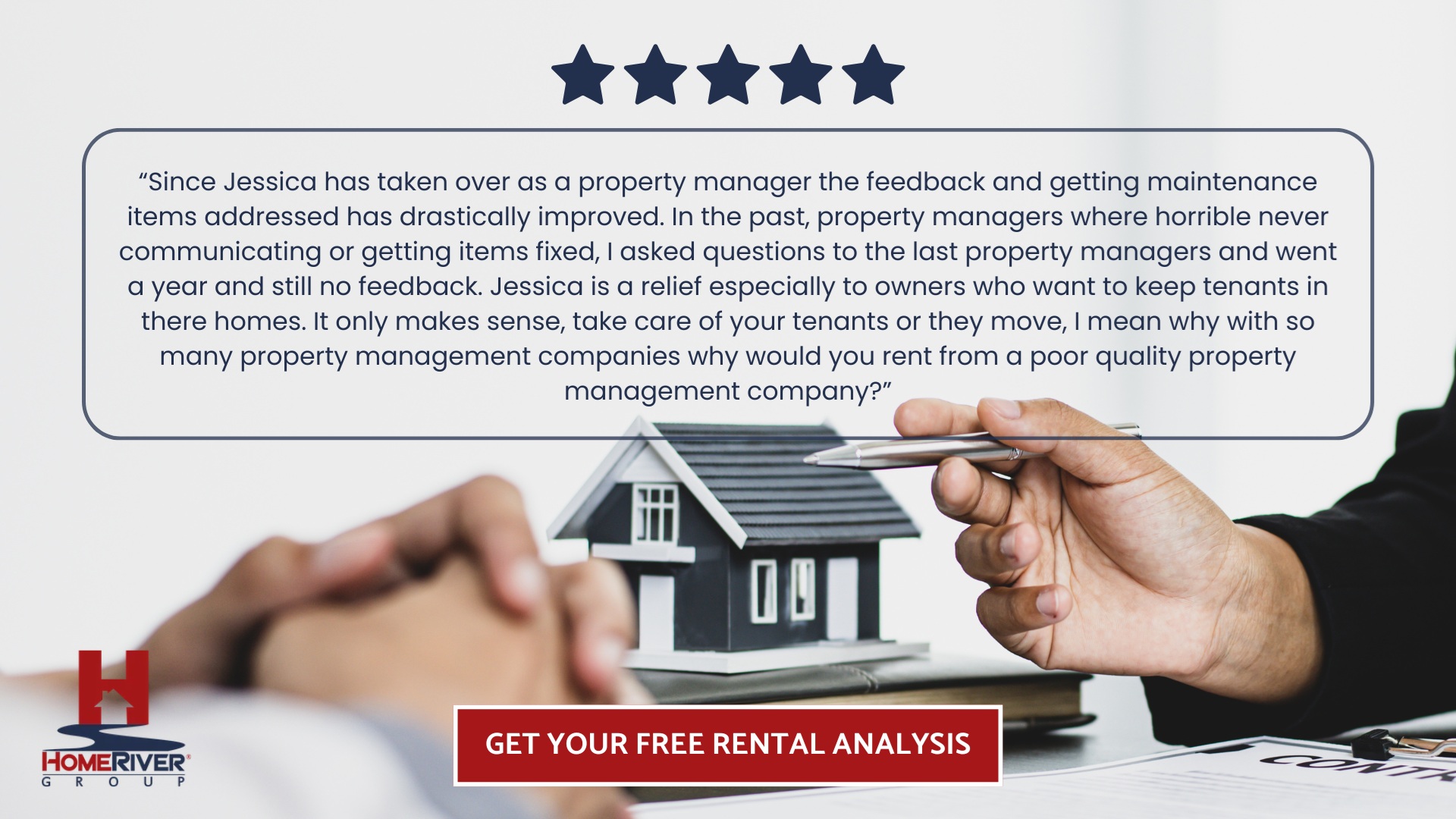
Property Management Agreement Basics: What Every Landlord Should Know
At HomeRiver Group, we recognize the nuances and complexities inherent in managing real estate portfolios. Our extensive multi-state footprint combined with our unified national platform equips us to offer a unique blend of local market expertise and centralized operations.
In real estate, landlords and property owners must manage their investments effectively to ensure good returns and keep tenants happy. A key part of this is having a solid property management agreement. This document clearly defines property owners' and management companies' roles, responsibilities, and expectations. Knowing the basics of this agreement can help landlords get the most out of their properties while avoiding risks and misunderstandings.
In this article, we will explore the key components of a property management agreement, including essential clauses, responsibilities, fees, and how to evaluate your property manager’s performance to ensure a successful and profitable partnership.
Essential Elements Of A Property Management Contract
Understanding the contract's components is crucial when entering into a property management agreement. This understanding ensures a harmonious relationship between the landlord and the property management company and that the property is managed according to the owner's expectations.
Here are the key elements every landlord should look for in a property management contract:
The contract should clearly outline the services the property management company, such as HomeRiver Group, will provide. These include property marketing, tenant screening, rent collection, maintenance, and financial reporting. Equally important is the fee structure for these services. Most property management companies charge a percentage of the monthly rent collected and other fees for additional services. Understanding this section helps assess the value offered by the management company.
While the property management company takes on a significant portion of managing the property, the contract should also detail the landlord’s responsibilities. This may include obligations like providing necessary funding for repairs, maintaining appropriate insurance coverage, and supporting the property manager in fulfilling their duties effectively.
The term of the agreement is an important clause that specifies how long the contract will last, whether for a fixed period or on a month-to-month basis. It should also detail the renewal process and the conditions under which either party can terminate the agreement. This ensures clarity and provides a timeline for the partnership.
This section outlines the extent of the property management company’s authority. It addresses what decisions the management can make on the owner's behalf and under what circumstances they need to seek approval. For example, it typically includes limits on the amount that can be spent on property maintenance without landlord consent.
The agreement should have a clause explaining the dispute resolution process between the property owner and the management company. It might include mediation or arbitration procedures in case of a disagreement. This is crucial in providing a clear roadmap for handling conflicts, should they arise.
A termination clause is essential as it outlines the conditions under which either party can end the contract. It usually specifies the notice period required and any penalties for early termination. This part of the contract protects the landlord and the property management company by setting clear expectations for ending the relationship.
The contract should detail the property management company's liability, including insurance requirements. It often stipulates that the property manager shall not be held liable for certain incidents or damages while also requiring them to hold adequate insurance coverage. This section is critical for protecting both parties from unforeseen circumstances.
Duties And Responsibilities: Landlord vs. Property Manager
Delineating the duties and responsibilities of the landlord versus those of the property manager is paramount to a successful partnership in a property management agreement.
Here’s what every landlord should understand about the division of responsibilities in such an agreement:
Landlord Responsibilities
The landlord’s responsibilities generally revolve around maintaining ownership obligations and ensuring that the property manager has the necessary resources and authority to manage the property effectively.
Key responsibilities include:
Providing the property manager with accurate and comprehensive information about the property, including any restrictions, easements, or codes that must be adhered to.
As agreed upon in the property management agreement, ensure financial arrangements are in place for expenses related to the property, such as maintenance, repairs, and improvements.
Deciding on broad strategic objectives for the property, such as targeted renter demographics, financial goals, and preferred occupancy levels.
Property Manager Responsibilities
The property manager’s responsibilities are tailored to maximize the value and profitability of the property while minimizing the landlord’s day-to-day operational burdens. Responsibilities typically include:
Tenant acquisition and retention involve marketing the property, screening prospective tenants, executing lease agreements, and maintaining tenant relations.
Day-to-day operations and maintenance of the property, ensuring that it remains in a good and habitable condition, addressing repairs, and conducting routine inspections.
Financial management and reporting include collecting rent, managing operational expenses, and providing the landlord with regular financial statements and performance reports, leveraging HomeRiver Group’s centralized operations and reporting capabilities.
Legal compliance ensures all operations align with local, state, and federal regulations, including housing laws, health and safety standards, and lease agreements.
The Collaboration Between Landlord And Property Manager
The property management agreement serves as the foundation for the partnership between the landlord and the property manager. Establishing clear expectations and responsibilities allows both parties to work collaboratively to achieve shared objectives.
The Financials: Fees And Payment Structures
Navigating the financial components of a property management agreement is crucial for every landlord to understand, ensure clarity, and avoid potential pitfalls.
Types Of Fees In Property Management Agreements
Management Fee: This is a core component of most property management agreements. It is typically a percentage of the monthly rent collected and is payable for managing the property. The rate can vary based on the property type and services offered.
Set-Up Fee: Some property management companies charge an initial fee to set up the account. This fee covers preparing the property for rent, including inspections and creating a management plan.
Leasing Fee: This fee compensates for the efforts involved in finding and placing a tenant. It can be a flat fee or a percentage of the first month's rent. It compensates for advertising, showing the property, and screening potential tenants.
Maintenance Fee: While some companies include a markup on all maintenance work done on the property, others might charge a separate fee for coordinating repairs and maintenance.
Late Fee Allocation: Property management agreements should clearly state how late fees collected from tenants will be divided. While it can incentivize managers to ensure timely rent collection, landlords should understand the agreed-upon split.
Understanding Payment Structures
Property management companies typically offer various payment structures for different needs and investment strategies. HomeRiver Group provides a flexible fee structure tailored to the individual needs of our clients:
Flat-Rate Fee: Some property managers opt for a flat monthly fee regardless of the rent amount. This can be beneficial for high-rent properties, providing cost predictability.
Tiered Pricing: This model offers different service levels at various price points, allowing landlords to choose the level of service that best fits their needs and budget.
A La Carte Pricing: Some property management companies offer the option to pay for only those services as needed rather than a full-service contract for landlords who only need specific services.
Termination Clauses: Ending The Agreement Amicably
Termination clauses outline the conditions under which either party can terminate the agreement before the end of its term. For landlords, understanding these clauses is crucial for several reasons. First, they provide a clear exit strategy if the property management company doesn't meet expectations or the landlord's situation changes. Second, they help to minimize potential legal disputes by setting out the terms for ending the relationship in a mutually agreeable manner.
Key elements typically found in termination clauses include:
Notice Period: This specifies how much notice must be given by the party wishing to terminate the agreement. A common requirement is 30 to 60 days written notice, allowing both parties sufficient time to make necessary adjustments.
Early Termination Fees: Some property management agreements include an early termination fee clause. These fees compensate the management company for the loss of expected income and the resources already invested in managing the property. Understanding the structure of these fees is essential to avoid unexpected costs.
Outstanding Obligations: The clause should clearly outline any obligations of both parties that will survive the termination of the agreement. This might include settling any outstanding fees or completing maintenance works that were in progress.
Procedure For Handover: To ensure a smooth transition, the agreement should detail the process for handing over documents, keys, and other materials related to real estate asset management. This helps prevent misunderstandings and ensures that the property is adequately cared for until a new management arrangement is in place.
Performance Metrics: Evaluating Your Property Manager
Once you've entered into a property management agreement, it's essential to understand how to evaluate your property manager's performance. Establishing clear performance metrics at the outset ensures that you, as a landlord, can hold the property management company accountable and ensure your property is managed efficiently and effectively.
Occupancy Rates
A primary indicator of a property manager's effectiveness is their ability to maintain high occupancy rates. A successful property manager will have strategies to minimize vacancies and ensure your rental property remains profitable.
Tenant Satisfaction
Tenant satisfaction is crucial for long-term success. Regular feedback from tenants can provide insightful data on the property manager's communication, problem-solving capabilities, and overall management efficiency. Higher tenant satisfaction often correlates with longer lease terms and fewer vacancies.
Financial Performance
Evaluating your property's financial performance involves analyzing the budget to actual expenses, income generated, and overall return on investment (ROI). Competent property managers should provide detailed financial reports regularly, highlighting discrepancies and explaining overages.
Property Maintenance And Inspection Reports
Regular maintenance and inspections are essential in preserving your property's value and ensuring tenants' safety and satisfaction. A detail-oriented property manager will have a proactive maintenance schedule and provide timely inspection reports, ensuring small issues are addressed before becoming costly repairs.
Communication And Responsiveness
Effective communication is the backbone of a successful landlord-property manager relationship. Assess how quickly and efficiently your property manager responds to inquiries and issues. Regular updates on your property's status, including any challenges and solutions, should be standard.
Final Thoughts
Understanding these agreements' essential components and specifics ensures your property is managed efficiently, preserving its value while generating consistent income. With the right property management partner, like HomeRiver Group, landlords can achieve this delicate balance through exceptional service and unparalleled local market expertise.
HomeRiver Group stands out in the property management landscape thanks to our commitment to providing a comprehensive array of services and our deep understanding of our local markets. Our national presence, bolstered by meticulous operations, asset management, and reporting capabilities, assures landlords that their property is a priority.
Landlords must make a critical decision about which company to entrust with their property management needs. With HomeRiver Group, you gain a partner committed to the longevity and prosperity of your investment.
Read also:
How Property Management Companies Can Benefit Florida Landlords
Financing Your Real Estate Portfolio - A HomeRiver Group Guide
Frequently Asked Questions About Property Management Agreement
What is a property management agreement?
A property management agreement is a legal contract between a property owner and a management company that outlines responsibilities such as maintenance, tenant relations, and financial reporting.
Why do landlords need a property management agreement?
It sets clear expectations, protects the landlord's investment, and ensures the property is managed professionally while providing a framework for legal protection and dispute resolution.
What are the typical responsibilities of a property manager?
Property managers handle marketing, rent collection, maintenance, tenant issues, inspections, and compliance with housing regulations.
Can a property management agreement be terminated early?
Yes, early termination is possible if obligations aren’t met or by mutual agreement, as outlined in the contract terms.
How long does a property management agreement typically last?
Agreements usually last one to two years and have renewal options, depending on the owner’s and management company’s preferences.
What are the costs associated with hiring a property manager?
Depending on the agreement, costs include management fees (a percentage of rent) and leasing, maintenance, and emergency fees.










